Alzheimer's disease is one of the
top 10 diseases Americans die from each year, but it is the
only one on that list that is expanding as the other causes of death are declining.
Alzheimer's disease is a degenerative brain disease and the most common form of dementia.
"Alzheimer's is becoming a more common cause of death as the
populations of the United States and other countries age," notes the
Alzheimer's Association. "While other major causes of death continue to experience significant declines, those from Alzheimer's continue to rise."
One reason for this difference is that the other leading fatal
illnesses are preventable, such as stroke and heart disease, but
Alzheimer's cannot be prevented with lifestyle changes. According to the
Alzheimer's Association,
preliminary data from between 2000 and 2008 showed that deaths attributed to Alzheimer's
increased 66 percent, while those attributed to the No. 1 cause of death, heart disease, decreased by 13 percent.
Such statistics make the latest Alzheimer's research so vital for
those who suspect they may get the disease, those already suffering from
it and their friends and family, who may provide some level of
in-home caregiver support during the long course of the disease.
Some of the biggest news about
Alzheimer's currently is the importance of early detection.
"Biological changes associated with Alzheimer's disease are thought
to begin 10 to 15 or perhaps 20 years before an individual displays
symptoms," states Dr. Heather Snyder, senior associate director of
medical and scientific relations at the Alzheimer's Association. "But
there is no single generally accepted way to identify the disease in its
earliest stages -- before symptoms are evident. At the same time,
Alzheimer's therapies are in development that may be able to slow or stop the progression of the disease."
There are efforts underway to update the diagnostic criteria in a
variety of ways, including biomarker measures. This spring, the
National Institute on Aging (NIA) and the Alzheimer's Association published new diagnostic criteria guidelines for Alzheimer's disease in
Alzheimer's and Dementia: The Journal of the Alzheimer's Association.
You might ask: If the disease cannot currently be stopped or cured, what difference does early detection make?
"The benefits of early detection are many," says Beth Kallmyer,
senior director of constituent services at the Alzheimer's Association.
"People who are diagnosed early can participate in the planning of their
future -- they can talk to their families about advanced directives,
how they want to have their
finances handled, what they want to have happen when they can't drive anymore."
Not only does this allow the person with Alzheimer's disease to feel empowered, Kallmyer says, but it's a huge relief to their
caregivers
and loved ones who otherewise may have to make decisions under a great
deal of stress later, when the disease is in its advanced stages.
We recently posted an article on
Homewatch Caregivers
that pulls from the Alzheimer's Association's own 10 Signs of
Alzheimer's list. There is a distinct difference between the signs of
normal aging and early Alzheimer's disease. For example, someone may
answer the phone and simultaneously put down their keys, then not be
able to find them a few minutes later. A normal aging brain will retrace
their steps and remember the moment that they answered the phone,
whereas an individual with Alzheimer's disease will not remember the
phone call or be able to retrace their steps.
Kallmyer points out that the role of an in-home
caregiver
to someone with Alzheimer's is unique in the length of the disease and
increased need. "It starts with helping with memory aides and then ends
when the person with Alzheimer's can do nothing for themselves," she
says.
Another benefit to early detection of
Alzheimer's disease
is that the individual can decide if they want to be part of future
Alzheimer's research by signing up to participate in clinical trials.
"When somebody has a fatal illness, clinical trials can be a great way
for them to feel like they are making a change," Kallmyer says. "They
might feel like they are making a difference for their kids and
grandkids."
Ultimately, with hopes that there will be treatments for
Alzheimer's disease,
the time to intervene will be in the earliest stages of the brain
disease. "This approach envisions what is now common practice in heart
disease," says Dr. Snyder. "Where early signs of risk -- for example, in
genetic markers or in blood cholesterol and/or blood pressure levels --
can be treated to reduce the chances of heart attack or stroke later
on."
Dr. Snyder said there is a lot more research to be done on
Alzheimer's disease.
"There are many unanswered questions in Alzheimer's disease," she says.
"We do not yet know the causes of the disease, we do not know risk
factors associated with Alzheimer's disease."
By Leann Reynolds





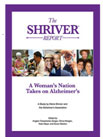 With the release of The Shriver Report: A Woman's Nation Takes on Alzheimer's Disease, repeated appeals are made for the passage of NAPA in Hill visits, Administration briefings, Washington policy briefings, and by Maria Shriver in interviews on This Week and other news programs.
With the release of The Shriver Report: A Woman's Nation Takes on Alzheimer's Disease, repeated appeals are made for the passage of NAPA in Hill visits, Administration briefings, Washington policy briefings, and by Maria Shriver in interviews on This Week and other news programs. 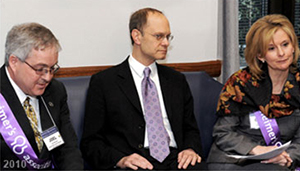
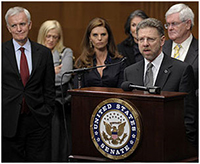 That same day, advocates attending the 2009 Alzheimer's Association Advocacy Forum visited their Members of Congress urging support for these key Alzheimer's Study Group recommendations, the beginning of the Association's ongoing campaign to accomplish this objective in the 111th Congress.
That same day, advocates attending the 2009 Alzheimer's Association Advocacy Forum visited their Members of Congress urging support for these key Alzheimer's Study Group recommendations, the beginning of the Association's ongoing campaign to accomplish this objective in the 111th Congress. 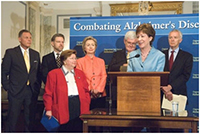
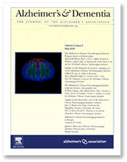 Speaker Newt Gingrich and Robert Egge author an article in Alzheimer's and Dementia: The Journal of the Alzheimer's Association. This article, "Developing a National Alzheimer's Strategy Equal to the Epidemic," first makes the case for the creation of a federal Alzheimer strategy.
Speaker Newt Gingrich and Robert Egge author an article in Alzheimer's and Dementia: The Journal of the Alzheimer's Association. This article, "Developing a National Alzheimer's Strategy Equal to the Epidemic," first makes the case for the creation of a federal Alzheimer strategy.